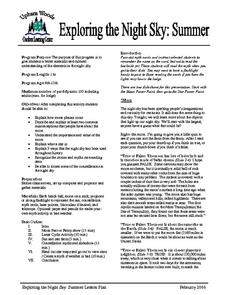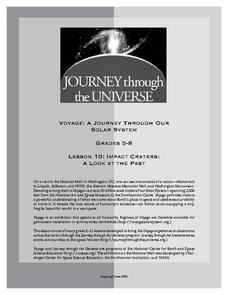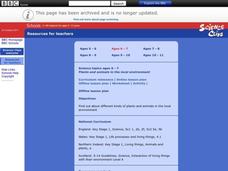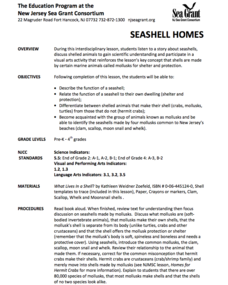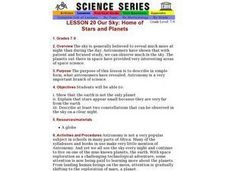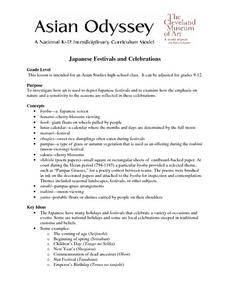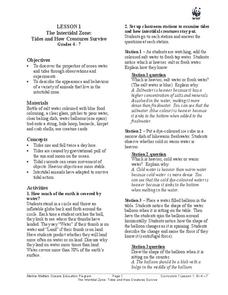DocsTeach
Landing a Man on the Moon: President Nixon and the Apollo Program
Take the small step for man and giant leap for mankind with the Apollo astronauts using primary sources. Young historians explore the documents related to the American space program up through the lunar landing, including presidential...
University of Colorado
Happy Landings: A Splash or a Splat?
Huygens spacecraft landed on Saturn's moon Titan in 2005, making it the farthest landing from Earth ever made by a spacecraft. In this hands-on activity, the 12th installment of 22, groups explore how density affects speed. To do this,...
University of Colorado
Distance = Rate x Time
Every year, the moon moves 3.8 cm farther from Earth. In the 11th part of 22, classes use the distance formula. They determine the distance to the moon based upon given data and then graph Galileo spacecraft data to determine its movement.
Curated OER
Exploring the Night Sky: Summer
Students explain how moon phases occur. They describe and explain at least two common misconceptions that people have about the moon. Students explain what a star is. They explain 3 ways that the night sky has been used throughout history.
Messenger Education
Look But Don’t Touch—Exploration with Remote Sensing
Mars is home to the tallest mountain in our solar system, Olympus Mons. In this set of two activities, learners review geologic land formations through the analysis of aerial maps. They then apply this knowledge to aerial maps of objects...
Journey Through the Universe
Impact Craters: A Look at the Past
The Galle crater on Mars is also known as the Happy Face crater because of its appearance. First, scholars use pebbles and flour to simulate craters and study their properties. They then apply this knowledge to help decipher the history...
Curated OER
Exploring the Night Sky: Fall/Winter
Students explain how moon phases occur. They explain three ways that the night sky has been used through history. Students locate some of the constellations in the night sky. They discuss stories and myths surrounding stars.
Indian Land Tenure Foundation
Tribal Origin Stories
The teacher reads and retells Californian tribal origin or creation stories that come from the traditions of a variety of California Indian tribes. Then, pupils get together in groups and retell the stories they just heard; just as the...
Curated OER
Solar System: The Four Inner Planets and Earth's Moon and Astronauts
Second graders read THe Magic School Bus: Lost in the Solar System. In this language arts and science lesson, 2nd graders explore the four inner planets. Students view the inner planets using Google Earth.
Curated OER
The Apollo Program And Lunar Archaeology
Students examine history and importance of Apollo Program, explore how Cold War helped create and sustain Apollo Program, and investigate how and why archaeologists and historians are attempting to preserve Apollo landing sites on moon.
Messenger Education
Exploring Exploring
The reason people first began trading was because of their desires for objects other societies possessed. In the activity, classes discuss why exploration has been a common thread in all societies and where these desires have taken...
Curated OER
Plants And Animals in the Local Environment
Students observe the various living things they can find outside their playground making sure to look both on the ground and in the air. They develop a large poster Venn digram, as a class, of plants and animals that live in the air, on...
It's About Time
Communication Through Space
If humans do find aliens, how would we communicate with them? An intriguing lesson walks through some of the challenges associated with this question. How long would a message take to reach a specific destination, what language should we...
Messenger Education
Mission: Possible—How Can We Plan an Exploration of Another World?
An astronaut's spacesuit weighs 280 pounds and takes 45 minutes to put on — that's a serious suit! The second activity of a three-part series allows pupils to see all that goes into space exploration. Through simulations, groups analyze...
McGraw Hill
Study Guide for Island of the Blue Dolphins
Dive your class into a reading of Island of the Blue Dolphins with this in-depth study guide. Breaking the novel into three parts, the resource begins each section with a focus activity that identifies a specific theme or question to be...
Curated OER
Seashell Homes
Pupils listen to a story about seashells. They discuss shelled animals. Learners describe the function of seashell. Pupils relate the function of a seashell to their own dwelling. They differentiate between shelled animals that make...
Curated OER
Our Sky: Home of Stars and Planets
Students discover that astronomy is a branch of science that includes the study of planets, stars, and constellations.
Curated OER
Loggerhead Turtle Fun Facts
Learners study loggerhead turtles and learn facts about reptiles. In this turtles lesson, students read information about loggerhead turtles and study their various sections and characteristics. Learners then make their own sea turtle.
Curated OER
Japanese Festivals and Celebrations
Students investigate the importnce of celebrations anf festivals in Japanese culture and then create a story based upon an image from the instructional activity. Resource links are provided for images of events.
Curated OER
The Intertidal Zone: Tides and How Creatures Survive
Students study the properties of ocean water and tides and learn about animals that live in intertidal zones. In this intertidal zone activity, students participate in classroom stations to learn about fresh water and salt water, cold...
Curated OER
Lesson One: Flag Day
Pupils discuss importance and symbolism of flags to United States and its people, discuss history and meaning of American flag, identify flags of other countries, analyze symbolism of color, shape, and design, and view images of Civil...





